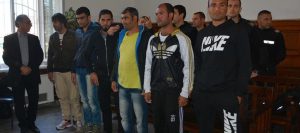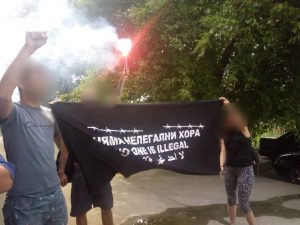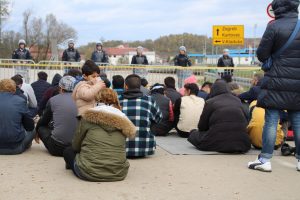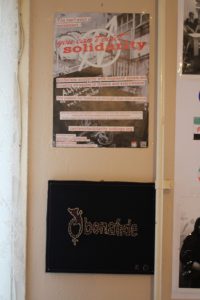Folgender Bericht von Genoss*innen , die derzeit in Subotica vor Ort sind, um Menschen auf ihrer Flucht zu supporten:
Lebensbedingungen vor der serbisch-ungarischen Grenze
Ein Bericht über die Situation illegalisierter Menschen an einer europäischen Grenze
Seit dem 12.12.2018, sind wir nun in Subotica, einer Stadt in Serbien an der Grenze zu
Ungarn. Zu dritt arbeiten wir als Teil der Organisation aus Spanien escuela con alma und
versuchen Menschen, die auf der Flucht in die EU sind, mit dem Lebensnotwendigen zu
unterstützen .
Escuela con alma begleitet die Menschen auf der Flucht seit gut 1,5 Jahren, schafft
Öffentlichkeit für ihre Situation, dokumentiert Polizeigewalt und hat Strukturen für
Unterstützer*innen und zur Versorgung geschaffen. Momentan gibt es zwei Orte, in denen die Menschen in ihrer Zeit in und um Subotica wohnen. Ein Ort ist außerhalb der Stadt, der andere mitten im Zentrum. An den beiden Orten ist die Situation sehr unterschiedlich, weshalb wir sie getrennt voneinander beschreiben möchten.
Horgos
Der Ort ist 1,5km von der ungarischen Grenze entfernt und ca. eine Stunde Fußmarsch
zur nächsten Einkaufmöglichkeit. Die Menschen wohnen in alten, kaputten Scheunen, in einer selbstverwalteten Struktur, welche nur durch escuela con alma Unterstützung bekommt.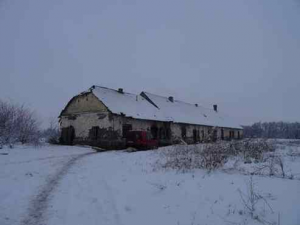
Hier wohnen ca. 40 Menschen, unter ihnen auch einige Minderjährige. Es hat sich eine
Versorgung mit Strom (Autobatterien), Wasser, Waschdienst und Essen etabliert, die durch uns getragen wird. Zudem wurden Öfen gebaut, sodass zumindest drei Räume beheizbar sind.
Der Hygienestandart hängt von der Unterstützung ab: Einen Wasseranschluss gibt es nicht und somit auch keine Waschmöglichkeit abseits der mobilen Dusche, welche momentan mit viel Aufwand repariert werden muss. Daher ist der Hygienestandart insgesamt leider eher schlecht, auch wenn wir uns sehr bemühen. Auch können Räumlichkeiten nicht zufriedenstellend gereinigt werden. Dazu kommt, dass es keine medizinische Versorgung gibt. Einige leiden an Verletzungen durch die Strapazen der Flucht oder Polizeigewalt und Folgen der unzureichenden Hygiene.
Schön zu sehen ist, dass es eine gewachsene Struktur ist. Die Menschen leben in Gemeinschaft,
kochen füreinander und essen zusammen. Sie sind gut organisiert und solidarisch im Umgang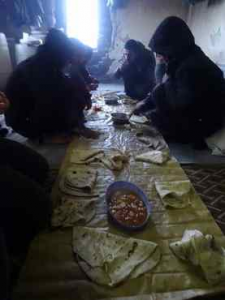
miteinander. Jedoch ist der Grund für eine solche Gemeinschaftsbildung weniger erfreulich, denn die Grenze zwingt sie zum ewigen Ausharren. So verbringen einige schon ein Jahr hier und haben kaum Perspektive, was auch starke Auswirkungen auf die Stimmung hat. Doch Verzagen ist keine Option. Serbien selber ist ein armes Land mitniedrigen Aufnahmequoten. Wie uns berichtet wurde sind die Aufnahmelager überfüllt und bieten auch keine lebenswürdigen Bedingungen.
Der Weg in die EU ist gut gesichert: es gibt zwei unter Strom stehende Zäune mit Stacheldraht, Wärmekameras mit 8km Reichweite, Wachhunde, Lautsprecher in vier Sprachen und schon beim Annähern an den Zaun gewalttätige Polizei. Sind solche Versuche dann doch einmal erfolgreich, berichteten uns Geflüchtete, dass es immer wieder zu illegalen und brutalen Push-Back-Aktionen kommt. Nach dem Dublin III-Abkommen wäre Ungarn für das Asylverfahren verantwortlich, sobald ein Geflüchteter das Territorium betritt. Werden die Menschen nicht aufgenommen sondern ohne Verfahren zurückgeschickt widerspricht dies dem geltenden Recht.
Train Station
Die Situation des Ortes in der Stadt ist ganz anders: Die leerstehenden Häuser werden seit einem 3⁄4 Jahr besetzt. Es sind offene, fensterlose Ruinen. Es gibt keine Heizm öglichkeiten, keinen Strom und auch sonst keine Infrastruktur. Hier ist eine höhere Fluktuation an Menschen, erst vor ca. 10 Tagen kam eine Gruppe neu an, welche komplett neu ausgestattet werden musste. In den alten Gebäuden der Train Station sind etwas mehr Menschen insgesamt und auch mehr Minderjährige. Doch abgesehen von den 11-17Jährigen sind sie überwiegend sehr jung.
öglichkeiten, keinen Strom und auch sonst keine Infrastruktur. Hier ist eine höhere Fluktuation an Menschen, erst vor ca. 10 Tagen kam eine Gruppe neu an, welche komplett neu ausgestattet werden musste. In den alten Gebäuden der Train Station sind etwas mehr Menschen insgesamt und auch mehr Minderjährige. Doch abgesehen von den 11-17Jährigen sind sie überwiegend sehr jung.
Wir schätzen ihre Situation insbesondere durch die extremen Temperaturen (bis -10Grad) als lebensbedrohlich ein. Zwar haben wir sie mit vielen Sachspenden (vor allem mit Decken und warmer Kleidung) unterstützt und so die physische Bedrohung minimiert, doch durch ihre Ausweglosigkeit sind sie zusätzlich psychisch extrem belastet. So wurde uns u.a. gezeigt und erzählt, dass sich Minderjährige selber verletzen.
Wir können ihnen auch kein Essen vorbei bringen: zum einen gibt es keine Kochmöglichkeit für sie, zum anderen sind unsere finanziellen Möglichkeiten und zeitlichen Ressourcen sehr begrenzt.
Wir sind jedoch sehr froh, dass wir viele Schlafsäcke und Decken sowie wärmere Kleidung vorbei bringen konnten, doch Bedarf besteht noch immer.
Hier wäre, durch die mangelnde Hygiene sowie die härteren Bedingungen, eine medizinische Versorgung noch dringlicher. Auch die Polizei geht in der Stadt aggressiver gegen die Fliehenden
vor. So wurde uns schon mehrmals von gewalttätigen Übergriffen berichtet. Einige wurden auch kontrolliert (z.B. bei Razzien) und nach 5-7 Stunden in Gewahrsam mit der Aufforderung, die
Stadt zu verlassen, frei gelassen.Nach dem ersten Besuch in den alten Scheunen außerhalb waren wir schockiert. Doch als wir dann den Ort in der Stadt besucht haben, konnten wir kaum fassen, wie Menschen in solchen prekären Bedingungen leben müssen.
Warum die Fliehenden hier sind, haben uns einige ausdrücklich gezeigt und erzählt. Vorwiegend stammen sie aus Afghanistan, aber auch aus dem Iran und Pakistan. Uns wurden viele schreckliche Bilder gezeigt, die die Taliban hinterlassen. Geköpfte Menschen, tote Kinder, blutüberströhmte Mädchen und Bilder von Folterungen. Da wir ganz grundlegende medizinische Versorgung machen (das Desinfizieren und Verbinden von Wunden), kam auch einer vorbei, der, seit er ausgepeitscht wurde, ständig schmerzende Muskeln und Narben hat. 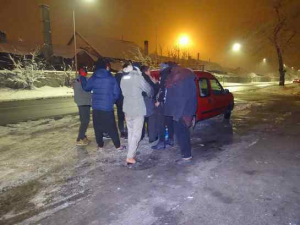
In Erzählungen wurde uns berichtet, dass viele vor dem „Bürgerkrieg“ fliehen, in dem 41 weitere Staaten mitmischen. Sie erzählen nicht nur vor den Taliban, sondern auch von Problemen in Folge des Nato-Einsatzes in Afghanistan. Einer sieht auch das Eigeninteressen aller beteiligten Kräfte. Afghanistan sei ein Land voller Bodenschätze, in welchem um Machteinflüsse gekämpft und dies als Hilfe benannt würde. Er sieht es als Fluch an, in einem ölreichen Land geboren zu sein und absurd, dann in ebendiese Länder zu fliehen, die davon profitieren wollen. Aber ein sicheres Leben wird ihnen als Flüchtlinge nirgends gewährt. Dass es auch in der EU schwer ist, wissen sie. Sie haben innerhalb von der EU sehr unterschiedliche Ziele. Einige haben auch bereits Familie innerhalb der EU und hoffen, bei ihnen sein zu können.
Die dramatischen Bedingungen der Menschen mitzubekommen, war für uns zum einen schockierend zum anderen haben wir auch viel Respekt vor dem Durchhaltevermögen. Deutschland trägt auf verschiedenen Ebenen eine Mitverantwortung. So werden Fluchtursachen – etwa durch Waffenexporte, direkter Kriegsbeteiligung, Landgrabbing und einer klimaschädlichen Politik – mit verursacht. Gleichzeitig werden Asylgesetze immer weiter verschärft und Anforderungen an sichere Herkunftsländer weiter runter gesetzt.
Wir fordern die Aufnahme der Aslysuchenden in die Länder der EU!
Wir fordern insbesondere die sofortige Aufnahme der Minderjährigen Geflüchteten vor den
Grenzen der EU!
Wir fordern ein sicheres Bleiberecht für alle!
Wir fordern einen sicheren Fluchtweg in das Zielland, damit keine Menschen mehr im
Mittelmeer ertrinken müssen oder auf Landwegen erfrieren und vor Erschöpfung oder
durch Gewalttaten sterben müssen!
Wie ihr unterstützen könnt?
Zum einen könnt ihr uns spenden, um ganz akut die Lage der Menschen zu verbessern.
Zum anderen müssen wir uns in unseren Städten mit Geflüchteten solidarisieren und ihre
Kämpfe für ein sicheres Leben unterstützen. Schafft sichere Häfen, bildet solidarity cities,
protestiert und und und.
Gerne könnt ihr auch hier vorbei kommen: An den Grenzen werden immer
Unterstützer*innen gebraucht!
Spenden an:
Escuela con alma
IBAN: ES26 1491 0001 2521 0291 7925
BIC: TRIOESMM, Triodos Bank
Betreff: Donation „Proyecto Dragonfly“
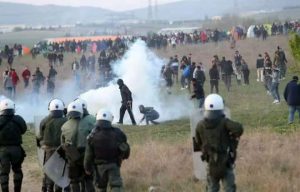 Stand vom 5.4.2019: Derzeit gibt es in Nordgriechenland Mobilisierungen an die griechisch-mazedonische (bzw. griechisch-ablanische) Grenze. Tausende Menschen machen sich in einer Karawane auf den Weg, mit dem Ziel die Grenze zu überqueren. Tausende von Cops versuchen dies zu verhindern und haben die Karawane gestern mit Tränengas angegriffen, einzelne Menschen wurden verhaftet.
Stand vom 5.4.2019: Derzeit gibt es in Nordgriechenland Mobilisierungen an die griechisch-mazedonische (bzw. griechisch-ablanische) Grenze. Tausende Menschen machen sich in einer Karawane auf den Weg, mit dem Ziel die Grenze zu überqueren. Tausende von Cops versuchen dies zu verhindern und haben die Karawane gestern mit Tränengas angegriffen, einzelne Menschen wurden verhaftet.
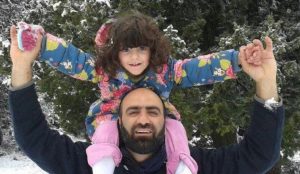


 öglichkeiten, keinen Strom und auch sonst keine Infrastruktur. Hier ist eine höhere Fluktuation an Menschen, erst vor ca. 10 Tagen kam eine Gruppe neu an, welche komplett neu ausgestattet werden musste. In den alten Gebäuden der Train Station sind etwas mehr Menschen insgesamt und auch mehr Minderjährige. Doch abgesehen von den 11-17Jährigen sind sie überwiegend sehr jung.
öglichkeiten, keinen Strom und auch sonst keine Infrastruktur. Hier ist eine höhere Fluktuation an Menschen, erst vor ca. 10 Tagen kam eine Gruppe neu an, welche komplett neu ausgestattet werden musste. In den alten Gebäuden der Train Station sind etwas mehr Menschen insgesamt und auch mehr Minderjährige. Doch abgesehen von den 11-17Jährigen sind sie überwiegend sehr jung.
